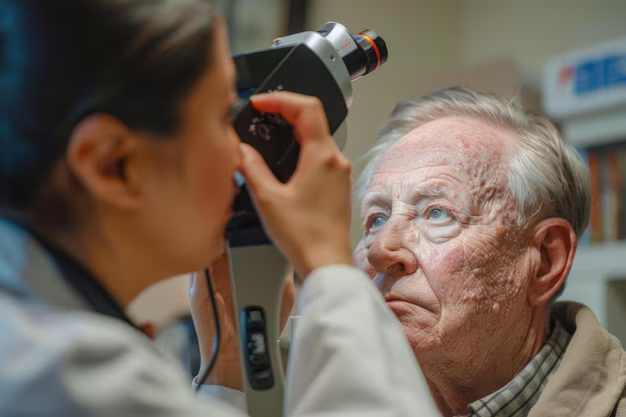Your Guide to Does Medicare Part b Cover Cataract Surgery
What You Get:
Free Guide
Free, helpful information about Cataract FAQ and related Does Medicare Part b Cover Cataract Surgery topics.
Helpful Information
Get clear and easy-to-understand details about Does Medicare Part b Cover Cataract Surgery topics and resources.
Personalized Offers
Answer a few optional questions to receive offers or information related to Cataract FAQ. The survey is optional and not required to access your free guide.
Understanding Medicare Part B Coverage for Cataract Surgery: What You Need to Know
Cataracts are a common eye condition affecting millions, leading to cloudy vision and, if untreated, eventual blindness. Many older adults worry about the cost of cataract surgery and whether their insurance will cover it. If you're navigating Medicare, you might be asking, "Does Medicare Part B cover cataract surgery?" Here's a comprehensive guide to help you understand what to expect from your Medicare benefits and cataract surgery.
🏥 The Basics of Cataract Surgery
Cataract Surgery Explained
Cataract surgery involves removing the cloudy lens of the eye and replacing it with a clear artificial lens. This outpatient procedure seeks to restore clear vision and improve the quality of life for those affected.
Why It's Necessary
Left untreated, cataracts can severely impair vision and lead to blindness. Surgery is the only effective treatment to remove cataracts and restore vision.
📜 Medicare Part B and Cataract Surgery Coverage
Understanding Medicare Part B
Medicare Part B is part of Original Medicare, and it primarily covers outpatient services. It pays for medically necessary services and preventive services, including doctor visits, lab tests, and surgeries.
Coverage for Cataract Surgery
Medicare Part B covers cataract surgery if it is medically necessary, which usually means if cataracts are significantly affecting your vision. Coverage typically includes:
- Removal of the cataract
- Basic lens implants
- Surgical facilities fees
- Specific pre- and post-operative care
It's important to understand that while Part B covers the surgery, there are still out-of-pocket costs involved, such as deductibles, copayments, and coinsurance.
💸 Out-of-pocket Costs and Financial Considerations
Managing Costs with Medicare Part B
- Deductible: You're responsible for the deductible before coverage begins.
- Coinsurance: Medicare typically pays 80% of the approved amount for covered services after the deductible, leaving you with 20%.
- Non-covered services: Medicare does not cover premium lenses or other optional enhancements; costs for these are out-of-pocket.
Reducing Financial Burden
Consider supplemental insurance like Medigap to cover costs that Medicare does not, such as deductibles and coinsurance. Medicare Advantage Plans may also offer additional benefits but vary significantly in coverage.
🕵️ Navigating Related Expenses and Alternatives
Prescription Eyewear
After surgery, Medicare Part B covers one pair of prescription glasses or contact lenses, per eye, following cataract surgery. Ensure your optician qualifies for Medicare reimbursement before purchasing glasses.
Alternative Lenses
While basic lens implants are covered, advanced multifocal or astigmatism-correcting lenses are not. Discuss costs with your surgeon if considering these options.
🔎 Key Considerations Before Surgery
- Pre-Surgery Evaluation: Only proceed if a healthcare provider confirms cataract surgery is medically necessary.
- Choosing a Surgeon: Confirm they accept Medicare to maximize coverage benefits.
- Understanding Additional Fees: Clarify with your provider about any potential costs not covered by Medicare.
📝 Summary Table: Medicare Part B and Cataract Surgery
Here’s a quick recap:
| Aspect | Details |
|---|---|
| Covered Services | Cataract removal, basic lens, surgical fees, pre/post-op care |
| Uncovered Services | Premium lens options, non-basic eyewear |
| Out-of-pocket Costs | Deductible, 20% coinsurance |
| Additional Eyewear | Covers one pair post-surgery |
| Reducing Costs | Medigap or Medicare Advantage plans |
📅 Steps to Prepare for Cataract Surgery Under Medicare Part B
- Consult Your Doctor: Ensure surgery is necessary.
- Verify Medicare Providers: Choose surgeons and facilities that accept Medicare.
- Estimate Costs: Learn what Medicare and any additional insurance will cover.
- Consider Extra Insurance: Look into Medigap or Medicare Advantage for additional financial support.
- Prepare for Recovery: Arrange transportation and post-surgery care if required.
🚀 Final Insights
Understanding Medicare Part B coverage for cataract surgery can ease financial worries and help you make informed decisions. By knowing what's covered, including your out-of-pocket responsibilities and ways to mitigate them, you’re better prepared to manage the process. Remember, successful cataract surgery can significantly enhance your quality of life by restoring clear vision. Always consult healthcare providers for specific guidance tailored to your situation and ensure you’re engaging with Medicare-approved suppliers and practitioners. Your journey to clearer vision is supported by a thorough understanding of your Medicare benefits, ensuring peace of mind throughout the process.
What You Get:
Free Cataract FAQ Guide
Free, helpful information about Does Medicare Part b Cover Cataract Surgery and related resources.

Helpful Information
Get clear, easy-to-understand details about Does Medicare Part b Cover Cataract Surgery topics.

Optional Personalized Offers
Answer a few optional questions to see offers or information related to Cataract FAQ. Participation is not required to get your free guide.


